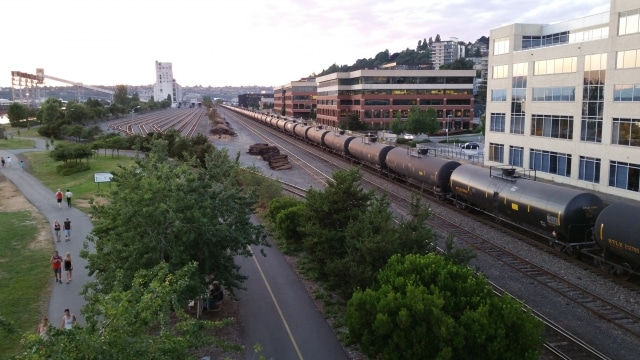Since the tragic Bakken oil train accident that extinguished 47 lives in Lac-Megantic, Quebec in July 2013, seven more Bakken oil trains have derailed, resulting in accidents involving large fires and explosions. We now know that oil produced in North Dakota’s Bakken Shale formation is extremely volatile due to its high natural gas liquid content — resulting in the “bomb train” phenomenon.
DeSmog’s new investigative video, written and produced by Justin Mikulka, details a coordinated effort by the oil industry, members of the U.S. Congress, regulators and the Department of Energy to challenge the known science of crude oil characteristics with the goal of delaying or avoiding any regulatory changes requiring Bakken crude oil stabilization, a safety measure that would protect the millions of people currently living in bomb train blast zones.
Stabilization is the process that removes the volatile natural gas liquids from the crude oil, resulting in a “stable” petroleum product with greatly reduced volatility and flammability.
DeSmog has reported extensively on the oil-by-rail policy battle, including an investigation that revealed the direct role of the White House in working with North Dakota regulators to avoid any requirements for oil stabilization for the Bakken crude.
The success of their misdirection campaign is evident — the mainstream media is largely overlooking this critical issue when the public needs referees to ask the tough questions on this vulnerability in our crude oil by rail protocols. Yet a Wall Street Journal article this week on how to make oil safe to transport didn’t even mention stabilization.
The video uses archival information from American Petroleum Institute videos, Congressional hearing testimony, news clips and more to reveal how the oil industry has avoided regulation in order to continue transporting dangerous Bakken crude by rail at maximum profit.
Warning: This video contains science, humor and political theater all in one — a volatile mix indeed!
WATCH: DeSmogCAST: The Science of Bomb Trains
Image credit: Oil train passing through Seattle, by Brendan DeMelle
Subscribe to our newsletter
Stay up to date with DeSmog news and alerts







